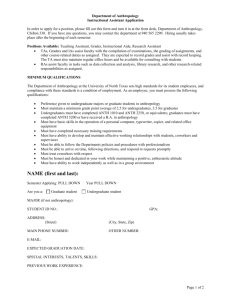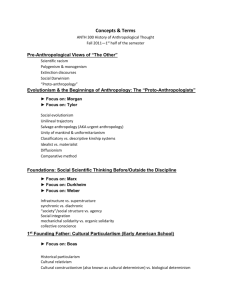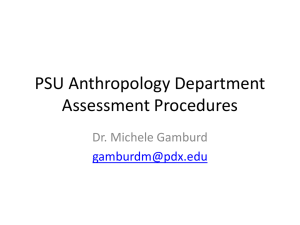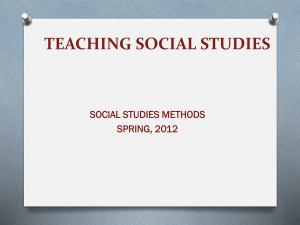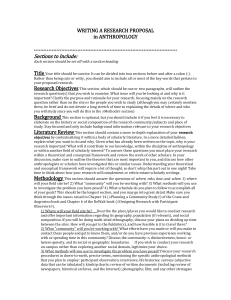View
advertisement
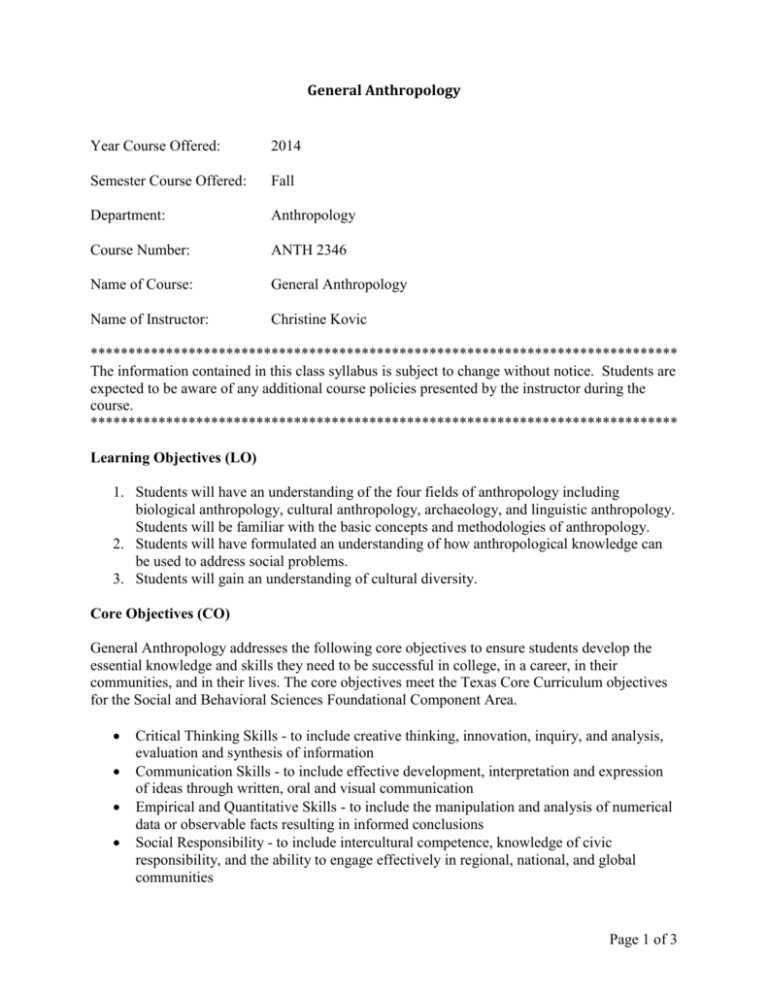
General Anthropology Year Course Offered: 2014 Semester Course Offered: Fall Department: Anthropology Course Number: ANTH 2346 Name of Course: General Anthropology Name of Instructor: Christine Kovic ****************************************************************************** The information contained in this class syllabus is subject to change without notice. Students are expected to be aware of any additional course policies presented by the instructor during the course. ****************************************************************************** Learning Objectives (LO) 1. Students will have an understanding of the four fields of anthropology including biological anthropology, cultural anthropology, archaeology, and linguistic anthropology. Students will be familiar with the basic concepts and methodologies of anthropology. 2. Students will have formulated an understanding of how anthropological knowledge can be used to address social problems. 3. Students will gain an understanding of cultural diversity. Core Objectives (CO) General Anthropology addresses the following core objectives to ensure students develop the essential knowledge and skills they need to be successful in college, in a career, in their communities, and in their lives. The core objectives meet the Texas Core Curriculum objectives for the Social and Behavioral Sciences Foundational Component Area. Critical Thinking Skills - to include creative thinking, innovation, inquiry, and analysis, evaluation and synthesis of information Communication Skills - to include effective development, interpretation and expression of ideas through written, oral and visual communication Empirical and Quantitative Skills - to include the manipulation and analysis of numerical data or observable facts resulting in informed conclusions Social Responsibility - to include intercultural competence, knowledge of civic responsibility, and the ability to engage effectively in regional, national, and global communities Page 1 of 3 Major Assignments/Exams The course components below are designed to meet the course objectives. Letter Assignment: Students will write a policy letter that applies anthropological concepts and knowledge to a contemporary social issue. The mock letter may be a letter to the editor of a newspaper or to a policymaker. LO 2: CO: SR, COM Exams: There will be three in-class exams during the semester. Exams will consist of multiple choice, short answer, and essay questions. LO 1; CO: CT, EQS Presentation: Working individually or in groups students will create a poster presentation which addresses an anthropological topic. LO3; CO SR, COM Learning Outcomes 1. Students will have an understanding of the four fields of anthropology including biological anthropology, cultural anthropology, archaeology, and linguistic anthropology. Students will be familiar with the basic concepts and methodologies of anthropology. 2 Students will have formulated an understanding of how anthropological knowledge can be used to address social problems. 3. Students will gain an understanding of cultural diversity. CO CT, EQS Assessment Methods Criteria/Targets Exams Using a rubric, students will be assessed on a 3point scale: excellent, acceptable, not acceptable. At least 70% of the students will score acceptable or above. SR, COM Letter Writing Assignment Using a rubric, students will be assessed on a 3point scale: excellent, acceptable, not acceptable. At least 70% of the students will score acceptable or above. SR, COM Poster presentations Using a rubric, students will be assessed on a 3point scale: excellent, acceptable, not acceptable. At least 70% of the students will score acceptable or above. Page 2 of 3 Required Reading 1. Robert H. Lavenda and Emily A. Schultz. 2011. Anthropology: What Does it Mean to Be Human? Oxford University Press. 2. Aaron Podolefsky, Peter J. Brown, and Scott M. Lacey. 2009. Applying Anthropology: An Introductory Reader. McGraw Hill. OR Elvio Angeloni. 2013. Annual Editions: Anthropology. List of Discussion/Lecture Topics 1. What is Anthropology? What are the four fields? 2. Making a Living 3. Politics and Social Organization 4. Culture, Language, and Communication 5. Gender 6. Religion 7. Primate Studies in Anthropology 8. Fossil Record and Human past 9. Globalization and Diversity 10. What is Culture? 11. Ethnography and Fieldwork 12. Social Inequality Page 3 of 3



